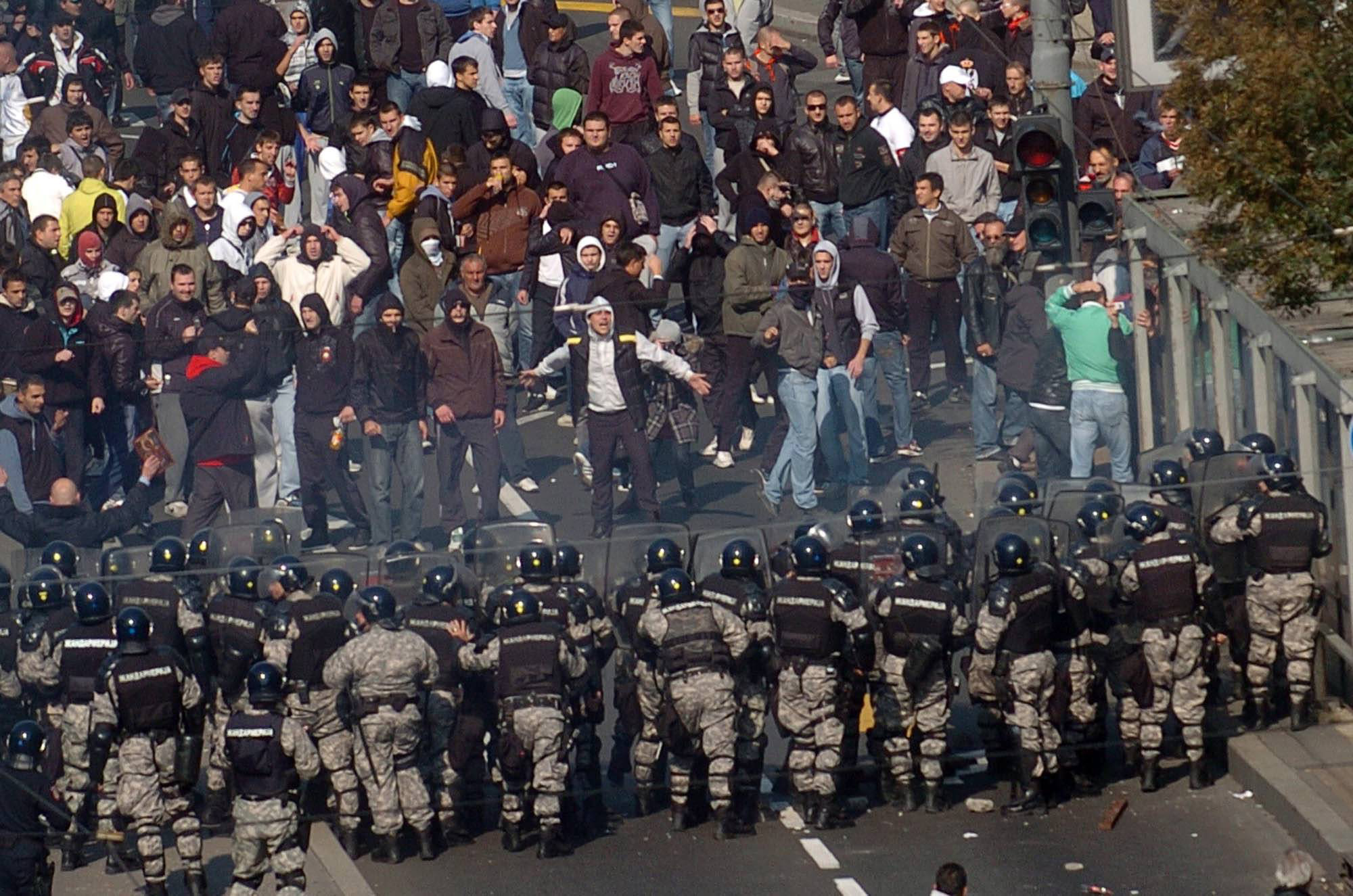By Ines Novacic
Serbia’s second Gay Pride parade took place in Belgrade on Sunday 10 October, with 5,000 police officers and members of special anti-terrorist Gendarmerie guarding the procession. By the time the parade was set to begin, police faced over 400 protesters chanting “death to homosexuals”. Most of these were students between the ages of 17 and 21. They argued that the money put aside by the State to provide Pride security could have been used to pay student fees.
According to The Guardian, “the 2010 parade, though imperfect, provides an illustration of the progress Serbia has made.” Following the parade, the rights of LGBT people and their status in society has seen modest exposure in the media, as news coverage focuses on the events that took place a few hundred metres beyond the protected procession.
Serbian newspaper Danas wrote that more than 1000 Pride participants marched safely through the planned parade route, while mobs of young hooligans rioted in the city streets.
According to the Serbian minister for health, Tomica Milosavljevic, more than 140 people have been injured in the day-long riots, including 124 police officers, 17 citizens and one Pride participant. Before the Pride parade, graffiti reading “We’re waiting for you” appeared on Belgrade buildings, courtesy of ultra right-wing nationalists and clerofascists. Organisations such as Obraz and 1389 publically demonstrated their against of LGBT people. Mladen Obradovic, chief secretary of Obraz, was arrested the week preceding the Pride parade.
Groups of young protesters gathered around Belgrade from early hours on the morning of the parade, indicating that the violence carried out was planned and deliberate. Serbian Newspaper Blic wrote that the parade itself presented an “excuse” for violent youths to mobilise on the streets and riot. Rather than certain key groups leading anti-Pride riots, intolerance among students was largely spread via websites and Facebook groups. Many used their Facebook pages to state their support for violent action against homosexuals.
Belgradian student Adrijana Zoric, 21, told Trinity News that among her colleagues at Belgrade Megatrend University, she was part of a minority that supported the Pride cause. “Most students consider homosexuality a sickness. One student I know published on his Facebook page: ‘The family is sacred, not these gays! Well done to hooligans for their bravery!’”
This is Belgrade’s second Pride in nine years. The parade that took place in 2001 saw 50 policemen and a few hundred participants attacked by more than 2000 demonstrators. Last year, Gay Pride was cancelled the evening before it was scheduled to take place, when the ministry of internal affairs and the Serbian state police claimed they could not guarantee the safety of the participants if the procession went ahead in Belgrade’s city centre.
In 2009, Bishop Amfilohije, the leading figure in Serbia’s Orthodox Church, identified the idea of Pride as a “Parade of Shame”, and evoked God’s punishment of the Biblical cities Sodom and Gomorrah. Amfilohije said that “gay and lesbian love leads to death and suicide.” He added, however, that the church could not condone violence.
According to statistics from the 2008 annual report by Gay Straight Alliance, a key Serbian LGBT advocacy group, seven out of ten citizens consider homosexuality to be an illness. One in two view homosexuality as dangerous and think the state should work on its suppression.
The 2009 GSA opinion survey, “Prejudices Exposed – Homophobia in Serbia”, revealed that 67 percent of the population regarded homosexuality negatively, while 11 percent considered homosexuals to be the same as everyone else.
In 2009, Serbia adopted an anti-discrimination law in accordance with EU legislation on human rights. On 31 August, article 387 of that law was expanded to recommend up to four years imprisonment for those who “publicly threaten a person or a group of people because of their race, skin colour, faith, nationality, ethnicity or any other personal beliefs and practices”. Under the same clause, all hate propaganda is prohibited.
“The problem is that students and youths now publicise their hate and promote intolerance through their Facebook pages,” Zoric said. “On the day of Pride, Belgrade was under attack by tear gas and Molotov cocktails, bins were set on fire, window displays smashed, and shops looted.”
More than 200 demonstrators have been arrested and damages to the city are estimated at one million euro.






